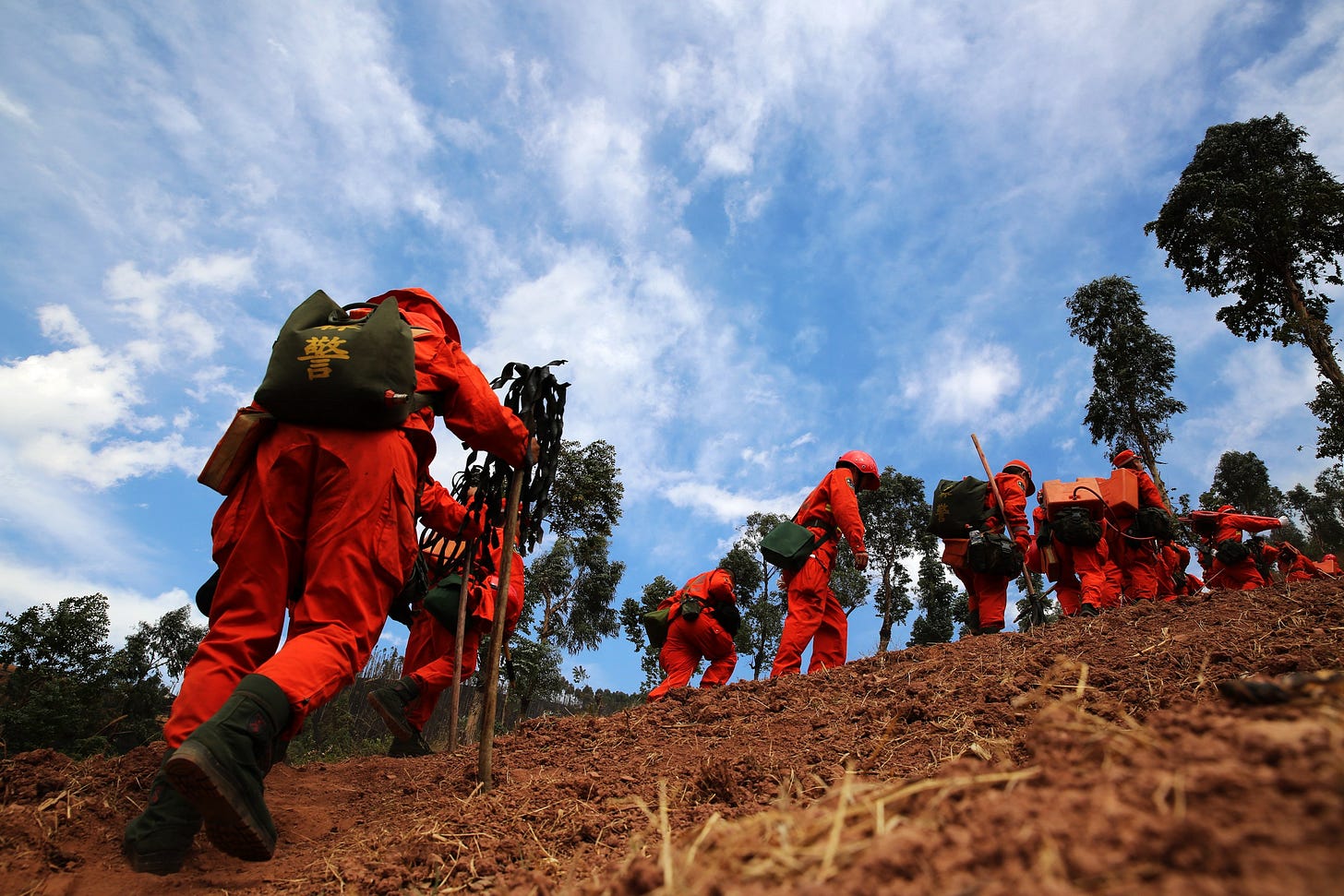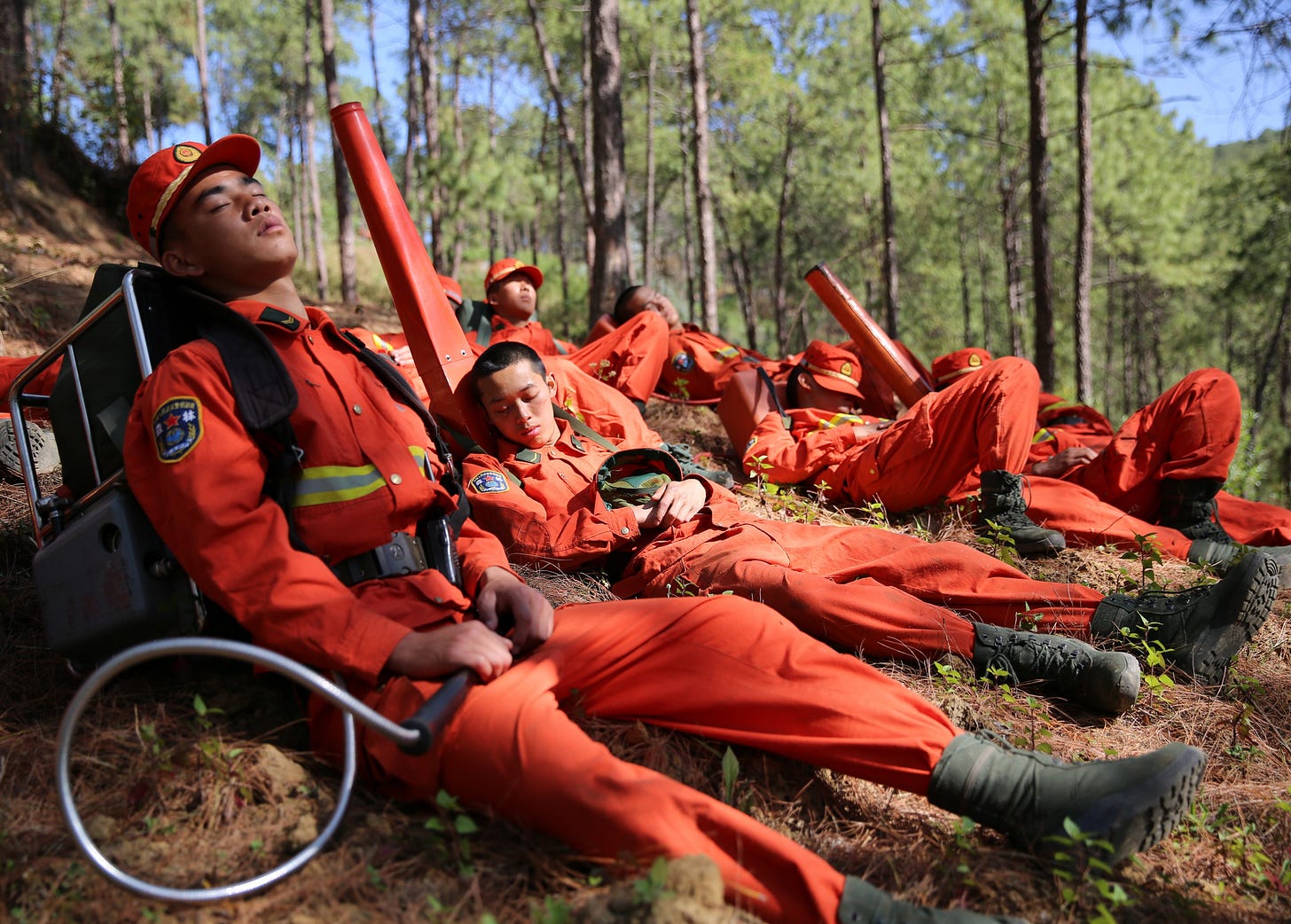Dear readers:
Earlier this year, a deadly forest fire broke out in Liangshan, in the southwestern province of Sichuan. Some 30 people died, including 27 firefighters. The inferno began in a remote and mountainous area when lightning struck an 80-year-old pine tree. Strong winds, dry air, and combustible materials fanned the flames, causing a massive explosion that killed several firefighters. The tragedy was the worst to hit China’s fire prevention services since 2015, when a warehouse explosion rocked the northern city of Tianjin. This edition of Chinarrative tells the story of the Sichuan bush fires, as first told by writers from the online publication Meirirenwu.
In other news, we’ve launched Chinarrative.com. In addition to the stories we’ve published in our newsletter, the site will feature website-exclusive interviews and essays. It’s also a place to tell our followers more about who we are and what we do, and offer ways to readers to support our project financially so that we can continue to deliver great nonfiction stories about China.
Follow us on Facebook and Twitter. Past issues are archived here. Thoughts, story ideas? We can be reached at editors@chinarrative.com.
The Darkness after the Fire

Credit: ImagineChina.
By Yi Fangxing
Every night in my dreams, I see my 18-year-old brother. He’s reaching out his hand with a look of despair on his face.
— A firefighter says of his fallen colleague.
It was April 5, Tomb Sweeping Day in China. Six days had passed since the forest fire that had claimed the lives of the 27 firefighters Muli County in the Lingshan area of Sichuan province. The bereavement event had ended; the memorial had been taken down, along with the police tape lining the route to the funeral parlor.
But the scars left by the forest fire still lingered, both physical and visceral.
For the surviving Liangshan firefighters, accepting the deaths of their colleagues was a far greater struggle than they imagined. Those once talkative grew taciturn. Some cried easily, while some walked about aimlessly in their grief. Others continued to relive that day, either in their memories or their dreams.
One of the civilian firefighters who had battled the blaze admitted that he was now afraid of fire.
A team of psychologists and therapists traveled to Xichang City, Sichuan province to help treat the survivors. Among them was Li Xiaojing, an expert from the Institute of Psychology at the Chinese Academy of Sciences. According to The Paper, Li found that some of the surviving firemen had already begun exhibiting stress reactions. One survivor told him:
When I’m on duty past midnight, I always feel like they’re following me. Sometimes I’ll wake up in the middle of the night, thinking they’ve come back.
Thus began their efforts to address the psychological trauma of the Liangshan fire. In the coming year, the firefighters and the family members of the victims will be receiving psychological support.
Even as they commemorate the victims, the survivors have only started tending to their own wounds.
Memories and Nightmares
On April 3, the surviving firemen gathered for a press conference.
The firefighters, clad in orange and yellow, lined up at the front of the room next to their assistant captain, who had also survived the fire. They were joined by colleagues who had not been deployed to fight the Liangshan fire, either because they were on leave that day or because they were standing watch.
Against the backdrop of clicking cameras, the firefighters grew emotional while sharing their experience, even breaking into tears. One survivor cried as he recounted their escape from the fire, saying:
Our captain had climbed up a tall tree at the time. There was nothing but smoke underneath him. Our instructor said that the lower part of the mountain was up in flames and gestured at us to go right. We had just reached the bottom of the ditch when we heard… the gusts of wind and the sounds of explosions coming from the hill across from us… and the smoke. Thick plumes of smoke.
They only had 10 seconds after the explosion to move. Ten of them fled toward the ridge to avoid the flames, but a fallen tree obstructed their path. One of the firefighters recalled, “I was the third one there. My instructor was in front of me and got stuck climbing over, so I gave him a push. Those 10 seconds felt like an eternity. I just rolled down from the tree because I felt like I was already burning. The fire was right at my back. I turned around to yell at my colleague behind me, an 18-year-old firefighter, but in that moment, all I saw was his look of utter despair.”
His voice faltered, and he sobbed for a few minutes before he could compose himself. Then he continued, “It’s been four days, but I see him in my dreams every night, saying, ‘Help me,’ and his burned hand…”
Three other firemen spoke next of their own experiences. As they did, they gritted their teeth and tried to hold back their tears, their faces twisting from the effort.

The dorm bed of a forest firefighter killed in the forest fire in Lianghsan. Credit: ImagineChina.
Moments of Frailties
Everybody has their own weaknesses.
The Xichang fire station, situated in the northern part of the city, has a vegetable garden, a rest area, dormitories, and a training ground. The men had shared fond memories there with their comrades and brothers, but after the fire, only bleakness and pain remained.
At 1 a.m. on March 31, the crew was dispatched from the station, along with firefighters in the area who were on leave, to battle the blaze. One of them messaged their captain, who was away for his wedding, “We’re out fighting another fire.”
Of the 42 men that set off, only 15 returned. The journey back to the station felt a little emptier. Aside from the press conference, the station was shrouded in silence. One survivor tried to eulogize his fallen colleagues, describing them all as “outstanding, really good” people. Before their deaths, some of them had been learning English; some were preparing for their weddings back home; and some had promised to make dinner for the whole team once they learned how to cook.
One firefighter had difficulties sleeping after that harrowing experience and the deaths of their comrades, saying, “Even if I do manage to fall asleep, I still wake up from the dreams.” Another firefighter added with a dazed expression, “I don’t know what I’m seeing.”
They also struggled with an intrusive, constant flood of memories.
Ren Zhixin, an instructor from the Zhangjiakou Economic and Technological Development Zone fire crew, empathized. He too had fought fires and understood the emotional trauma of losing crew members.
“Firefighters share a deep bond because it’s always the veterans teaching the new recruits. Everybody eats and rooms and lives together,” Ren explained. “Even now, I can still remember my fire captain from a decade ago, who taught me how to assess and extinguish a fire. There was a gas pipe explosion once that I wanted to see up close, but he shielded me with his body and said it was too dangerous.” Today, Ren extends that same protection and guidance to his new colleagues.
A survey on occupational stress found that the rate of post-traumatic stress disorder among policemen and firefighters was five times higher than that of ordinary people.
Of the firefighters who had responded to the 9/11 attacks, 5,000 had nightmares up to six years afterward, while 3,000 still undergo counseling and therapy.

Exhausted forest firefighters take a rest. Credit: ImagineChina.
Overcoming Shame of Fear
The fire had also traumatized the local residents who had aided the firefighting efforts and families who had lost loved ones.
One of the Muli County villagers, who had fought fires for five years, prided himself as “the veteran of a hundred battles.” A semi-professional firefighter who had received specialized training, he owned his own uniform and equipment, like blowers for extinguishing fires. Now, though, he has a fear of fire and even panics at the sight of a cigarette lighter.
He worries about the future, saying:
If a fire happened, I don't know if I would be brave enough to fight it.
Meanwhile, the families who have lost loved ones remain heartbroken. When their minibus drove past the funeral parlor, they pressed themselves against the windows, weeping inconsolably. During the memorial service held in Xichang’s Torch Square, some family members had to have their relatives carry them to the service. Others sobbed until they collapsed and had to be sent to the medics.
On the day of the Tomb Sweeping Festival, before the memorial was taken down, one woman went to visit her son’s grave. Before she left, she moved his photo closer to the window so that he could see the city one last time.
Two experts from the Institute of Psychology at the Chinese Academy of Sciences are using psychological intervention strategies to stabilize the survivors and the family members of deceased firefighters.
Many of the firefighters said that they relied on their sense of duty and honor to overcome their fears, but the counselors suggested that they face their emotions, rather than feeling ashamed of their fears.
On the afternoon of April 5, the forest police confirmed that the Muli fire had been caused by lightning, which had struck an 80-year-old pine tree.
At the time of that announcement, the Liangshan firefighters were at their posts continuing their training. They had to be ready for the next fire.
Translator: Katherine Tse


